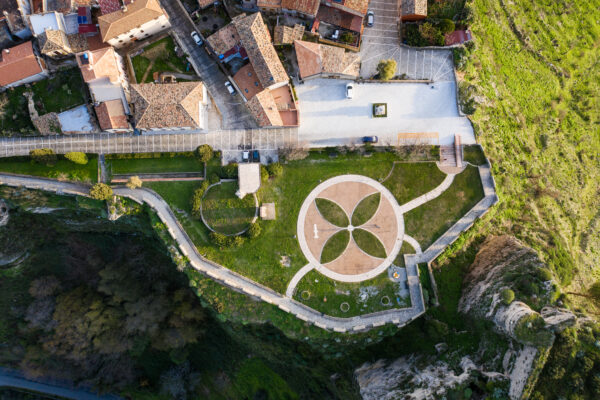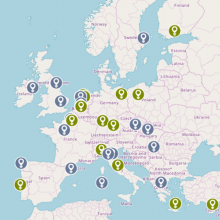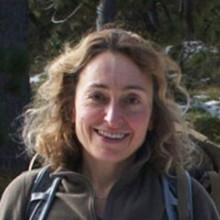To: 23/09/2024 18:00
Liquid-phase exfoliation of graphene has opened new avenues for the large-scale production of a wide range of 2D materials, including Transition Metal Mono- and Dichalcogenides. These materials, along with layered double hydroxides and novel layered materials such as MXenes, have demonstrated exceptional performance in energy storage (batteries, supercapacitors) and conversion (catalysis). Structural and morphological features and the presence of defects can either enhance or degrade their properties. On the other hand, this can also proactively be used to achieve certain functionalities using defect engineering. In this presentation, I will discuss various case studies highlighting the energy performance of 2D materials, and how aberration-corrected STEM techniques, combined with density functional theory, provide valuable insights into structure-property relationships. Atom-by-atom characterization is crucial for identifying and understanding the configurations of point defects, their mobility, and their influence on the electronic properties.
To: 16/09/2024 16:00
I will present an overview of our work on the automatic, computer-aided design of optical nanostructures. In the past few years, we have developed neural networks that can provide new designs for optical nanostructures with predefined optical response. These neural networks are trained with a large dataset obtained from numerical electromagnetic simulations. In particular, we have developed a conditional generative adversarial network that can predict lithographic masks for meta-atoms with desired transmission and reflection properties. We illustrate our machine-learning-based inverse design with examples of metasurfaces with refractive properties and a Zernike phase mask containing meta-atoms with interdependent properties. Finally, I will discuss some techniques to reduce the amount of simulations needed for the training data set.
Position Description
The Institute of Electronic Structure and Laser of the Foundation for research and Technology Hellas (IESL -FORTH), in the framework of the project THERMOCOOL, (P.I. Dr G. Deligeorgis, Call: HORIZON-CL5-2023-D3-03, GA 101160652), funded under HORIZON-RIA - HORIZON Research and Innovation Actions, is seeking to recruit one (1) research assistant.
Job Description
We are looking for 1 research engineer to work on the processing and characterization of polymeric pyroelectric materials. The work to be carried out is part of an EU-funded project and besides experimental work the selected engineer will be responsible for administrative work such as reporting and deliverable writing.
Required Qualifications
- BSc in Materials Science and Engineering, or Physics or Chemistry.
- MSc in Materials Science and Engineering, or Physics or Chemistry.
- Prior laboratory experience in polymer science.
- Prior knowledge and hands-on experience of basic materials characterization technics.
- Demonstrated good knowledge and use of English.
Desirable Qualifications
Good understanding of materials physics.
Application Procedure
Interested candidates who meet the aforementioned requirements are kindly asked to submit their applications, no later than September 20, 2024, 23:59 local Greece time to the address (hr@iesl.forth.gr), with cc to the Dr Eleni Pavlopoulou (epavlopoulou@iesl.forth.gr).
In order to be considered, the application must include:
- Application Form (Form Greek or Form English to the left)
- Detailed curriculum vitae (CV) of the candidate
- Scanned Copies of academic titles
Appointment Duration
12Position Description
The Institute of Electronic Structure and Laser of the Foundation for research and Technology Hellas (IESL-FORTH), in the framework of the project « Optical Quantum Controlled generation of Bose‐
Einstein Condensates», OQC, is seeking to recruit one (1) post-doctoral researcher.
Job Description
The successful candidate will contribute to the realization of an experimental apparatus capable of the detection and manipulation of late atom numbers below the shot-noise level.
Required Qualifications
- PhD in physics or related domains
- Experience in experimental research involving optics
Desirable Qualifications
- Good knowledge of (experimental) quantum mechanics or related
- Fluent in English, both written and spoken
- Interview
Application Procedure
Interested candidates who meet the aforementioned requirements are kindly asked to submit their applications, no later than September 20, 2024, 23:59 local Greece time to the address (hr@iesl.forth.gr), with cc to the scientific coordinator, Dr Wolf von Klitzing (wvk@iesl.forth.gr).
In order to be considered, the application must include:
- Application Form (Form Greek or Form English to the left)
- Detailed curriculum vitae (CV) of the candidate
- Scanned copies of academic titles
Appointment Duration
12Grant agreement ID: 101157364
Preserving the Past, Shaping the Future: your Gateway to a Collaborative and Innovative European Cultural Heritage Community
The European Collaborative Cloud for Cultural Heritage (ECCCH) is a shared platform designed to provide heritage professionals and researchers with access to data, scientific resources, training, and advanced digital tools tailored to suit their needs. This platform is developed by ECHOES (European Cloud for Heritage OpEn Science), a project funded by the European Commission and UK Research and Innovation (UKRI) that brings together fragmented communities of the Cultural Heritage field into a new community around the Digital Commons.
ECHOES will create a digital environment that enables the digitisation of existing knowledge and the collaborative analysis of cultural heritage assets, facts, and phenomena. In this context, actors – whether humans or Artificial Intelligence – can develop their interpretations, thereby enriching the knowledge of cultural heritage and their surroundings. The digital environment proposed by ECHOES will empower users to interact with, manipulate and enrich Digital Twins, fostering the creation of new, collaboratively developed scientific knowledge.
The ECCCH built by ECHOES is anchored in the principles of Open Science, which promotes inclusion and democratises access to knowledge and digital assets for all. This digital ecosystem will allow the creation of a new generation of heritage objects, the Digital Commons, which are semantically rich and collectively produced. Upon completion, ECHOES will provide a unified platform to integrate the outcomes of EU and national projects related to Cultural Heritage.
ECHOES’ mission is to set up the European Collaborative Cloud for Cultural Heritage (ECCCH), a shared platform designed to facilitate collaboration among heritage professionals and researchers, enabling them to modernise their workflows and processes. This platform will offer access to data, cutting-edge scientific and training resources, and advanced digital tools, all developed collaboratively by the heritage community to meet their specific requirements. ECHOES will integrate the currently fragmented communities within the Cultural Heritage (CH) sector, bringing together diverse actors from various fields and disciplines into a cohesive community focused on the Digital Commons.
What sets ECHOES apart is its commitment to a visionary paradigm shift in the CH field. The whole ECHOES consortium, representing all main actors of the European CH community, wants the CH sector to move away from an object-focused approach – where the digitisation of heritage objects is the ultimate goal -, to a holistic approach to digital transformation of both tangible and intangible assets. ECHOES will create a digital environment which will empower users to interact with, manipulate and enrich Digital Twins, leading to new, jointly developed scientific knowledge. This digital environment will allow the creation of a new generation of heritage objects, the Digital Commons, which are semantically rich and collectively produced – we see this as “the heritage of tomorrow”. At the end of the project, ECHOES will deliver a single platform to integrate results of EU and national projects on CH. The ECCCH will be sustainable thanks to its inclusive legal entity, which will be created before the end of ECHOES.


A key differentiator of ECHOES is also that it ensures synergies with other European initiatives in order to avoid duplication of efforts: e.g., the common Data Space for Cultural Heritage; EOSC; JPI-CH; CHARTER Alliance, ARCHE etc.
Overall ECHOES’ brings together for the first time all the actors of the CH and Social and Human Sciences sectors as well as renowned academic and private organisations in the field of computer science and data science. The case studies built around each of the Vertical Applications developed in the project is emblematic of such interdisciplinary and collaborative work. This collaboration is moreover ensured at multiple levels thanks to the Cloud’s national nodes.
ECHOES’ main strength is its consortium, which is extremely well placed to represent the wider community, as it includes 15 umbrella organizations representing more than 1000 organisations in Europe, and a variety of disciplines. Ultimately, the project will establish a pan-European network of key stakeholders from CH institutions, including a robust scientific and professional network and will be open to the cooperative efforts of a wide community of users.

Funding




